Question, Some Say, Is How Oppressed Can Be Heard
Homepage photo credit: Joseph Girmay/Flickr/Creative Commons
Journal-isms Roundtable photos by Sharon Farmer/sfphotoworks
Support Journal-ismsDonations are tax-deductible.
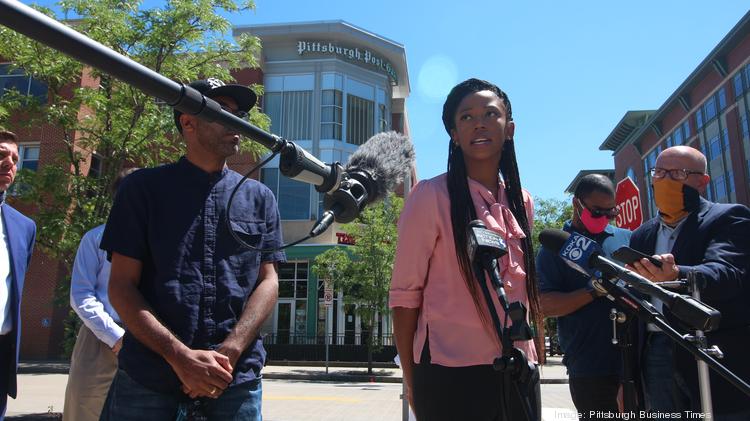
Question, Some Say, Is How Oppressed Can Be Heard
By Isaiah Jerome Lewis Poole
True or false?
“Most of the reporting that we see from our mainstream media is just disproportionately targeting power and ignores the oppressed.”
True, in the view of mainstream media leaders who say newsroom diversity means more than changing the demographics of their staffs. They say it also speaks to fundamentally altering who is served by newsroom decisions.
The quotation comes from Terrell Jermaine Starr, an independent Black journalist who has gained prominence for his unorthodox reporting style while covering the war in Ukraine, offering opinions and sometimes being directly involved in the story, such as by helping Ukrainians escape to safety.
Starr is believed to be the only Black journalist who has consistently reported from that country. He recently returned from Israel, tweeting in March when back in the United States, “I’m setting up an appointment with my therapist and my pastor. I’m in Brooklyn and I still feel [traumatized] by what I saw in the West Bank. I woke up over the past few days on the verge of vomiting. Seriously. What’s happening to Palestinians is that oppressive and violent.”
(On May 2, Khader Adnan, a leader in the militant Islamic Jihad group, became the first long-term hunger striker to die in Israeli custody. Adnan, 45, was protesting Israel’s mass detentions of Palestinians without charges or trials.)
That belief prompted his comment on Western coverage of the oppressed. He says he connected the dots in looking at coverage of those around the world who are not in positions of power. Starr is also completing a book, “A Black Man’s Guide to Eastern Europe.”
Starr spoke at the Zoom Journal-isms Roundtable on April 17, which began with a discussion of the legacy of the late Randall Robinson, the anti-apartheid activist and advocate for the African diaspora who died March 24 at 81.
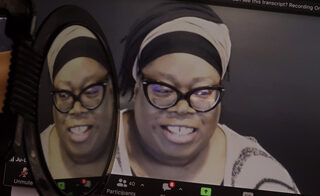 Attendees also toasted Ju-Don Marshall (pictured), just named president and CEO of WFAE, the public radio station in Charlotte, N.C.
Attendees also toasted Ju-Don Marshall (pictured), just named president and CEO of WFAE, the public radio station in Charlotte, N.C.
Marshall said she was trying “to expand our public media station here and move, you know, boldly into the digital realm. Public media has been a little bit behind other legacy media in moving towards digital.” With her were WFAE’s Gwendolyn Glenn and Sarah Smith, who “are also helping us engage more with communities of color, and, you know, through culturally competent journalism.”
Forty-six people were on the Zoom, with 213 more watching on Facebook and 64 on YouTube, as of May 1. You can watch the video embedded below or on the YouTube site.
Forty-six were on the Zoom, with 213 more watching on Facebook and 64 on YouTube, as of May 1.
The American Press Institute, part of the News Media Alliance, an organization of publishers, says it “advances an innovative and sustainable news industry by helping publishers understand and engage audiences, grow revenue, improve public-service journalism, and succeed at organizational change.”
Last year, API developed an “inclusion index,” which included a project involving five Pittsburgh media outlets. API says the index aims to help news outlets build deeper bonds of trust with communities of color and to provide more accurate and complete coverage of those communities’ challenges and triumphs. The project concluded earlier this year.
“Journalists often don’t think about the power imbalance at play in our relationships with our communities and the people who live in them,” said Michael D. Bolden, the API’s CEO and executive director. “News organizations have the power to harm and to heal, and unfortunately, we have seen too much of the former in our history. It’s imperative that individual journalists and organizations be aware of that dynamic and work to connect people to each other and to the information they need, and to empower our democratic society to live up to its promise.”

Newspaper readers in Addis Ababa, Ethiopia, 2004. “Privileged audiences may be concerned about, say, sensationalism, but they rarely pay a personal price. Disadvantaged communities do,” the Reuters Institute and the University of Oxford found. (Credit: Joseph Girmay/Flickr/Creative Commons)
A report by the Reuters Institute and the University of Oxford released April 18, was based on a sweeping set of focus group interviews in four countries. It found that people from disadvantaged communities saw “persistent misrepresentation and underrepresentation in coverage” of their issues and interests. That report also found that those marginalized, especially in the United States, United Kingdom and India, widely viewed news media outlets as “an extension of systems aligned to serve those in power …. News media were rarely seen as catering to the entire public so much as reinforcing the interests of those already most privileged and powerful.” (The fourth country covered by the report was Brazil.)
That issue is not new. In 1968, the Kerner Commission, in its report on the roots of Black unrest in the mid-1960s, said, “The media report and write from the standpoint of a white man’s world. The ills of the ghetto, the difficulties of life there, the Negro’s burning sense of grievance, are seldom conveyed. Slights and indignities are part of the Negro’s daily life, and many of them come from what he now calls ‘the white press’ — a press that repeatedly, if unconsciously, reflects the biases, the paternalism, the indifference of white America.”
Pushing against journalism practiced from “the standpoint of a white man’s world” was very much part of Robinson’s legacy.
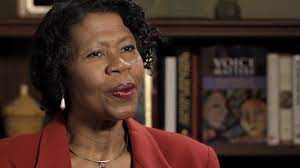 Gwen McKinney (pictured, via Facebook), a communications specialist who worked closely with Robinson and TransAfrica during its campaigns against South African apartheid and U.S. policies toward Haiti, remembered him as an “extremely sophisticated” activist who “understood that media was a critical element to launching these campaigns and not losing, but winning.”
Gwen McKinney (pictured, via Facebook), a communications specialist who worked closely with Robinson and TransAfrica during its campaigns against South African apartheid and U.S. policies toward Haiti, remembered him as an “extremely sophisticated” activist who “understood that media was a critical element to launching these campaigns and not losing, but winning.”
Robinson — along with Roundtable speakers McKinney and Cecelie Counts, TransAfrica’s political director — was hailed for helping journalists like former NBC News producer Allison Davis (pictured, below), Washington Post columnist Courtland Milloy, CBS News reporter Randall Pinkston and NPR journalist Brenda Wilson get stories about Africa and the Caribbean on the air that otherwise might not have surfaced.
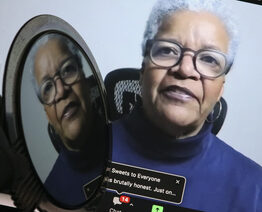 “I remember so vividly trying to explain to my executive producer where South Africa was and, and why this was important, and you would bring these wonderful voices. And then it was up to me,” Davis said.
“I remember so vividly trying to explain to my executive producer where South Africa was and, and why this was important, and you would bring these wonderful voices. And then it was up to me,” Davis said.
“I was the only Black show producer at the time to convince folks that this was not only a story that needed to be done, but this was a story that we really did need to educate people about, a side of the world that they very rarely heard about.”
Wilson recalled a risky move she made as a junior producer on NPR’s “Morning Edition” when the show was about to air a segment on U.S. policy on South Africa featuring Britain’s Lord Peter Carington, who was allied with the Reagan administration’s posture of “constructive engagement” with the apartheid regime.
“They were going to have Lord Carington on the air on ‘Morning Edition’, and nobody else to say anything about it, . . . And I don’t know what I knew, but I knew enough at the time, even though I was a 20-something, to call Randall.”
Wilson told Robinson, “‘Randall, you need to get here at 5 in the morning.’ And sure enough, he showed up at 5 in the morning … And we sat around and chatted, and he went live as a counterpoint to [Lord Carington.] And the senior producer came in shortly after Randall had done what he did. And he said, it worked. It worked. You still have a job. It worked. You know, because Randall was so good.”
(Counts also corrected many obits that noted that Robinson taught at Penn State Law School starting in 2008. While technically accurate, he taught remotely from St. Kitts, she said.)
Starr argued at the Roundtable that injecting nonwhite perspectives into foreign news coverage is still tantamount to an act of rebellion.
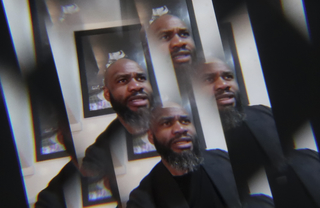
In his coverage, “I leveraged my experience as a Black person who grew up in Detroit, Michigan, and who lives in New York and talks about the various forms of how inequity functions here in the United States, and I take that experience and it guides me wherever I see it across the world, even with white people who are in Ukraine.”
Starr continued, “Most of the reporting that we see from our mainstream media is just disproportionately targeting power and ignores the oppressed because that language is not even used. I’m not sure that an editor at The New York Times, for example, or Politico would even allow ‘oppression’ or ‘oppressed people’ to go through their copy-editing process. And so I find that to be the fundamental problem,” in addition to “the lack of people of color” in media to cover “a world that’s full of nonwhite people in the majority that’s governed by a minority of white people.”
How does this change?
The Reuters Institute report recommended that media organizations be more diligent about making their reporting more accurate and less biased, tell more positive and complete coverage of diverse communities, hire journalists and news executives who make their staffs more reflective of the communities they serve, and be genuinely attentive to the needs of different audiences.
Dan Shelley, president and CEO of the Radio Television Digital News Association, is among those who say the news media are getting better at serving the interests of people across race and class lines.
“I believe responsible news organizations are now going to great lengths to serve the entire public, not just those with power and privilege,” Shelley wrote to Journal-isms.
While acknowledging that news organizations must do an even better job of both reflecting and meeting the needs of the communities they serve, “broadcast and digital news organizations are nearly universally making stronger efforts not only to employ more journalists of color but also from varied backgrounds and experiences. This is not just happening at the journalist level; it’s also happening in the ranks of newsroom and corporate news management.”
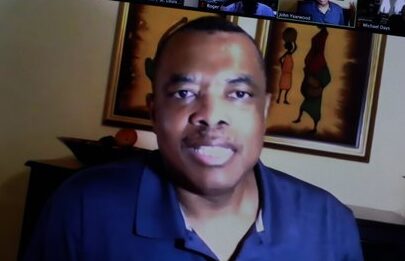 John Yearwood (pictured, from 2021) is one example. Formerly the global news editor at Politico, he was recently promoted to editorial director for diversity and culture. But before his promotion, one of his actions was to assign an article about Starr and his war coverage in Ukraine.
John Yearwood (pictured, from 2021) is one example. Formerly the global news editor at Politico, he was recently promoted to editorial director for diversity and culture. But before his promotion, one of his actions was to assign an article about Starr and his war coverage in Ukraine.
“I admired Terrell’s work for a long time,” he said at the Roundtable. Speaking directly to Starr, he said that now “I’m in the process of trying to bring more people who look like you and me to Politico.”
Yearwood mentioned Politico reporters Nahal Toosi and Joseph Gedeon as examples of journalists who bring different national and international perspectives to Politico’s coverage.
Bolden said that each of the four areas that are priorities for the American Press Institute — civic discourse and democracy, culture and inclusion, trust and community engagement, and revenue and resilience — “requires a commitment to diversity and to uplifting forgotten and unheard voices.
Rebecca Frank of the News Media Alliance and Samantha Ragland and Ellite Truong of the American Press Institute talk about their work with newsroom leaders on DEIB (diversity, equity, inclusion, and belonging) and encouraging a culture of experimentation in the newsroom in this April episode of API’s “News Take.” (Credit: YouTube)
“We thread it into all of our work, from Table Stakes, which focuses on transforming news organizations for a digital future, to Source Matters, our tool which focuses on bringing more source diversity into news coverage, to the API Inclusion Index, which examines diversity and inclusion at a macro level in news and information ecosystems and helps multiple news organizations craft and enact strategic plans to improve community engagement and trust.”
API’s recently completed Inclusion Index project involved the Pittsburgh Black Media Federation and five Pittsburgh-based news publishers, including the city’s leading newspaper, the Pittsburgh Post-Gazette. The National Association of Black Journalists awarded the Post-Gazette its Thumbs Down Award in 2020 for unfairly prohibiting two Black journalists from covering protests in the city following the death of George Floyd. It was among many who were alarmed by the Post-Gazette’s actions.
The API report noted that the “Pittsburgh news media ecosystem has significant deficiencies when it comes to inclusive practices both inside and outside of the newsroom,” but that “each newsroom has implemented some policies that, if expanded upon or adopted by other newsrooms, could provide the basis for larger transformations related to Diversity, Equity, Inclusion and Belonging, or DEIB, in journalism.”
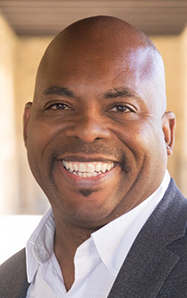 Bolden (pictured) added, “We are in talks with funders about deepening our work in Pittsburgh with more community listening and engagement for our news partners and possibly bringing in new ones. We’re also discussing other locations with community organizations and foundations, but we are not ready to make any public announcements.”
Bolden (pictured) added, “We are in talks with funders about deepening our work in Pittsburgh with more community listening and engagement for our news partners and possibly bringing in new ones. We’re also discussing other locations with community organizations and foundations, but we are not ready to make any public announcements.”
Some other Black media professionals question whether recommendations and initiatives like those go far enough.
McKinney, in an email, wrote that she sees U.S. news media as an institution “wired to play a dual role as both influencer and mirror of the larger society shaped by racism, sexism and ageism.” She cited as an example of the effects the findings of a recent study she commissioned by the Berkeley Media Studies Group that concluded that Black women — ”especially older Black women who can provide perspectives from potent lived experience as advocates, civic leaders, and experts in a vast array of sectors and subjects” — were significantly underrepresented in primetime cable TV news shows, even though they are “overperformers in electoral politics, advanced degrees, and business ownership.”
“What needs to change? Those who run and control the media. The advertisers who drive content. And the culture that embraces exclusion as an easier default than a reimagined projection of America’s ‘big tent.’ When the day comes that media decision-makers value the multi-hued people and cultures that make up our nation (and our world), there will be hope for fair and inclusive journalism. Until then, the status quo reigns.”
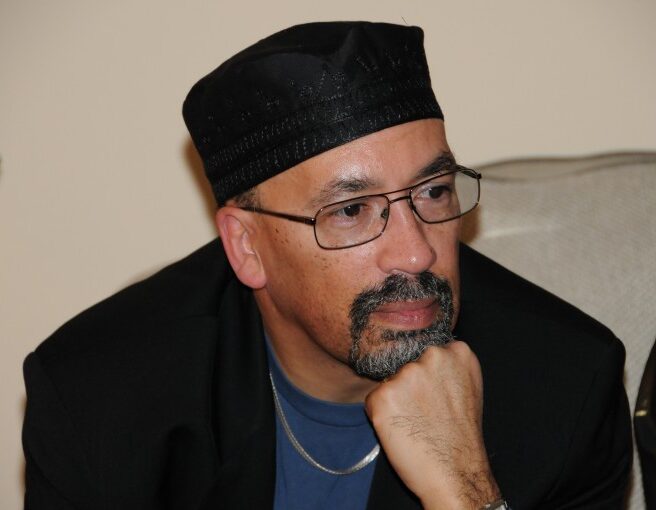 Bill Fletcher Jr. (pictured) a writer and activist who was a former president of the TransAfrica Forum, succeeding Robinson, said that mainstream media in the United States, tied as it is to a capitalist system, has an inevitable class orientation or bias that “is built into the way the machine works.” This bias, he said, “is simply not corrected by who gets hired and who gets promoted.” What’s necessary, he suggests, is “a reality check for the media” in the form of a grassroots advisory committee that has oversight over reporting standards, practices and priorities.
Bill Fletcher Jr. (pictured) a writer and activist who was a former president of the TransAfrica Forum, succeeding Robinson, said that mainstream media in the United States, tied as it is to a capitalist system, has an inevitable class orientation or bias that “is built into the way the machine works.” This bias, he said, “is simply not corrected by who gets hired and who gets promoted.” What’s necessary, he suggests, is “a reality check for the media” in the form of a grassroots advisory committee that has oversight over reporting standards, practices and priorities.
He is critical of existing media advocacy organizations, where he says the work “is all conducted in Latin” as far as average news consumers are concerned. He said he would like to see more of those consumers involved in pushing for better coverage of their communities.
“If it were up to me, every city would have its own public TV, radio, web channel, and some sort of news service that collected material from all over the world and made it available,” Fletcher said.
Asked whether public access fulfills that intent, Fletcher wrote, “Most public access tv that I have seen has been underwhelming. The programming is regularly mediocre. I am talking about something that is far more sophisticated and multilevel,” such as the news programming on PBS and on some of the major public radio stations. “We need something like PBS as a 24-hour news service. Then we need web programming along the lines of The Real News Network,” a nonprofit news organization that says it is dedicated to “rigorous journalism” that is “unafraid to engage alongside movements for change.”
The Center for Media Engagement at the University of Texas at Austin has launched the Solidarity Journalism Initiative to help media organizations improve their coverage of marginalized communities. “Solidarity journalism,” according to the initiative’s website, “means that journalists stand for basic human dignity and against suffering, and is practiced through newsworthiness judgments, sourcing, and framing that center the lived experiences of people subjected to unjust conditions. The decision to report – or not report – on these conditions inherently leaves neutrality behind.”
“It is a response to the misrepresentations produced by this inequity” between the privileged and the marginalized “and their failure to address the underlying causes of injustice,” said Brad Limov, graduate research assistant for the program.
The program holds virtual workshops, and its leader, assistant journalism professor Anita Varma, spoke last year at a packed session of the Asian American Journalists Association. The concept, Limov said, “has been well-received by journalists who hold social justice as an ethical priority and seek to better represent marginalized communities.” But he concedes that in the news industry as a whole, “they are perhaps in the minority.”
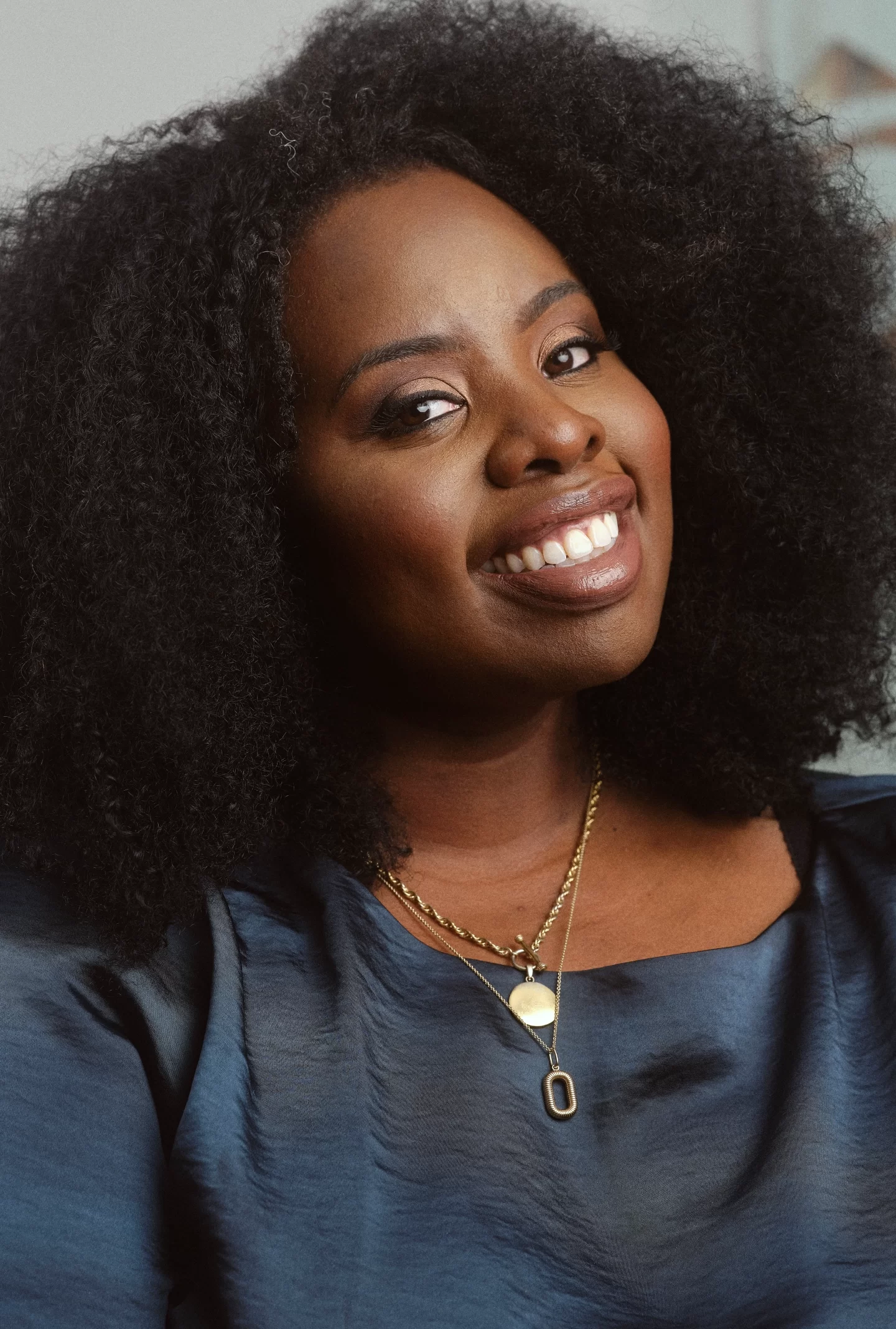 Akoto Ofori-Atta (pictured), co-founder of Capital B, a Black-led, nonprofit news startup, doesn’t use the term “solidarity journalism” to describe its philosophy. But she sees a difference in coverage about communities of color and coverage that serves communities of color. At Capital B, “we can provide service journalism that can help people navigate” the issues they face in their communities, she said, and “cast them as experts on how to navigate.”
Akoto Ofori-Atta (pictured), co-founder of Capital B, a Black-led, nonprofit news startup, doesn’t use the term “solidarity journalism” to describe its philosophy. But she sees a difference in coverage about communities of color and coverage that serves communities of color. At Capital B, “we can provide service journalism that can help people navigate” the issues they face in their communities, she said, and “cast them as experts on how to navigate.”
Ofori-Atta agreed that newsroom diversity must go beyond the complexion of the people in the room. “If your posture is that you can’t do the best journalism without the best representation, then the conversations you have are going to be very different than if you are just checking a box,” she said.
Ofori-Atta added that the collapse of the advertising model that sustained newsrooms for decades, a consequence of the rise of the internet, opens the door for all news outlets and for society at large to rethink how to reshape a news industry that is more reflective of and accountable to diverse communities as well as financially sustainable. “This is new terrain, and I’m glad we’re thinking very broadly,” she said.
- Natasha A. Kelly and Olive Vassell, Columbia University Press: Mapping Black Europe
- Mark Anthony Neal, The Root: Why Black People Should Care About Palestinian Liberation (video) (2020)
To subscribe at no cost, please send an email to journal-isms+subscribe@groups.io and say who you are.
Facebook users: “Like” “Richard Prince’s Journal-isms” on Facebook.
Follow Richard Prince on Twitter @princeeditor
Richard Prince’s Journal-isms originates from Washington. It began in print before most of us knew what the internet was, and it would like to be referred to as a “column.” Any views expressed in the column are those of the person or organization quoted and not those of any other entity. Send tips, comments and concerns to Richard Prince at journal-isms+owner@
View previous columns (after Feb. 13, 2016).
View previous columns (before Feb. 13, 2016)
- Diversity’s Greatest Hits, 2018 (Jan. 4, 2019)
- Book Notes: Is Taking a Knee Really All That? (Dec. 20, 2018)
- Book Notes: Challenging ’45’ and Proudly Telling the Story (Dec. 18, 2018)
- Book Notes: Get Down With the Legends! (Dec. 11, 2018)
- Journalist Richard Prince w/Joe Madison (Sirius XM, April 18, 2018) (podcast)
- Richard Prince (journalist) (Wikipedia entry)
- February 2018 Podcast: Richard “Dick” Prince on the need for newsroom diversity (Gabriel Greschler, Student Press Law Center, Feb. 26, 2018)
- Diversity’s Greatest Hits, 2017 — Where Will They Take Us in the Year Ahead?
- Book Notes: Best Sellers, Uncovered Treasures, Overlooked History (Dec. 19, 2017)
- An advocate for diversity in the media is still pressing for representation, (Courtland Milloy, Washington Post, Nov. 28, 2017)
- Morgan Global Journalism Review: Journal-isms Journeys On (Aug. 31, 2017)
- Diversity’s Greatest Hits, 2016
- Book Notes: 16 Writers Dish About ‘Chelle,’ the First Lady
- Book Notes: From Coretta to Barack, and in Search of the Godfather
- Journal-isms’ Richard Prince Wants Your Ideas (FishbowlDC, Feb. 26, 2016)
- “JOURNAL-ISMS” IS LATEST TO BEAR BRUNT OF INDUSTRY’S ECONOMIC WOES (Feb. 19, 2016)
- Richard Prince with Charlayne Hunter-Gault, “PBS NewsHour,” “What stagnant diversity means for America’s newsrooms” (Dec. 15, 2015)
- Book Notes: Journalists Follow Their Passions
- Book Notes: Journalists Who Rocked Their World
- Book Notes: Hands Up! Read This!
- Book Notes: New Cosby Bio Looks Like a Best-Seller
- Journo-diversity advocate turns attention to Ezra Klein project (Erik Wemple, Washington Post, March 5, 2014)

